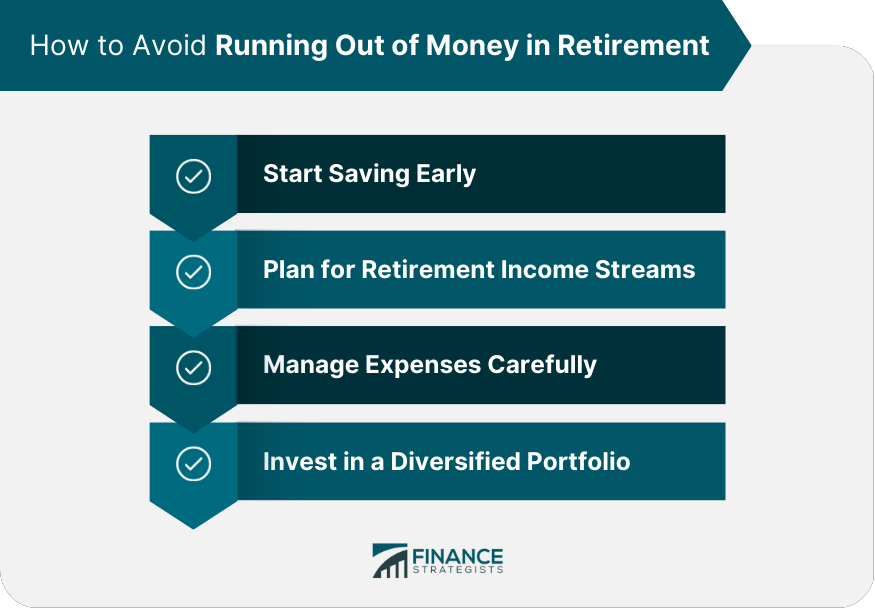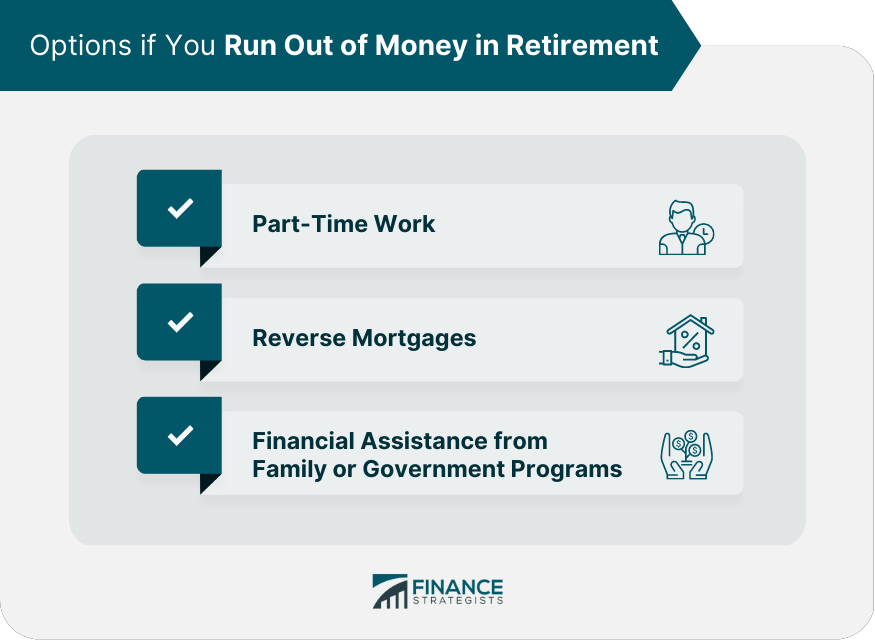If you run out of money in retirement, you may face financial hardship and reduced quality of life. You may need to rely on family members or government programs for financial assistance, reduce your standard of living, or make significant lifestyle changes. Retirement is a period of leisure, introspection, and pleasure, but it also requires individuals to handle their finances with great care. One of the retirees' most significant concerns is the possibility of running out of money. This is an uncomfortable topic for many, but understanding the risks of running out of money in retirement is critical to avoiding financial hardship later in life. To avoid this situation, saving for retirement, planning for retirement income streams, managing expenses carefully, and investing in a diversified portfolio are essential. Retirees face several risks when it comes to running out of money. One of the most significant risks is the uncertainty of how long they will need to rely on their retirement savings. People live longer and will need more money to cover their expenses. With this in mind, there is a higher chance that retirees will outlive their retirement savings. Another significant risk is the unpredictability of future expenses. Healthcare costs are rising rapidly, and retirees are particularly vulnerable to these costs. The potential consequences of running out of money in retirement can be severe. Retirees who run out of money may be forced to rely on family members for financial assistance or government programs like Medicaid or Supplemental Security Income (SSI). This can be a significant burden on family members and can cause emotional distress for the retiree. Retirees may have to reduce their standard of living and make significant lifestyle changes, such as moving to a less expensive area or downsizing their homes. There are several strategies that retirees can use to avoid running out of money for retirement. Retirees can avoid running out of money in retirement by starting to save as early as possible. This means contributing to a 401(k) or another retirement account, investing in stocks and bonds, and taking advantage of employer-matching contributions. Social Security, pensions, and annuities are potential sources of retirement income. Retirees should work with a financial planner to determine how much they can expect to receive from these sources and plan their retirement budget accordingly. Managing expenses is crucial in retirement. Retirees should create a budget and stick to it, avoid taking on unnecessary debt, and make lifestyle changes as necessary to reduce expenses. This may include downsizing a home, selling assets, or moving to a less expensive area. Investing in a diversified portfolio is another way to protect against the risks associated with running out of money in retirement. A diversified portfolio includes a mix of stocks, bonds, and other investments, which can provide both growth and income. Working with a financial planner to determine the right combination of investments for a specific retiree's needs and risk tolerance is crucial. Despite careful planning, some retirees may still find themselves in a position where they need more money in retirement. If this happens, there are several options that retirees can explore to supplement their income. Part-time work can provide additional income for retirees who want to continue working but cannot work full-time. This can also help retirees maintain social connections and a sense of purpose. A reverse mortgage is a loan that allows homeowners over the age of 62 to access the equity in their homes. Reverse mortgages can provide additional income in retirement, but they should be carefully considered as they may come with high fees and interest rates. Retirees may be able to seek financial assistance from family members or government programs. Medicaid and SSI are two government programs that provide financial assistance to low-income individuals. Retirees should work with a financial planner to determine eligibility for these programs and how to apply. Running out of money in retirement is a serious concern that can have severe consequences for retirees. However, individuals can take steps to minimize this risk by adopting a proactive approach to retirement planning. Strategies such as saving early and often, planning for retirement income streams, managing expenses carefully, and investing in a diversified portfolio can all help to safeguard against running out of money in retirement. If retirees find themselves in a difficult financial position, options such as part-time work, reverse mortgages, and government programs may be available to provide some relief. We encourage you to hire a retirement planning professional to ensure that you are well-prepared for retirement and take advantage of the many benefits professional financial advice offers. A retirement professional can help you develop a customized retirement plan that aligns with your goals and risk tolerance so that you can enjoy a comfortable and stress-free retirement.What Happens if You Run Out of Money in Retirement?
The Risks of Running Out of Money in Retirement
Strategies for Avoiding Running Out of Money in Retirement
Starting Saving Early
Plan for Retirement Income Streams
Manage Expenses Carefully
Invest in a Diversified Portfolio

Options if You Run Out of Money in Retirement
Part-Time Work
Reverse Mortgages
Financial Assistance from Family or Government Programs

Conclusion
What Happens if You Run Out of Money in Retirement? FAQs
If you run out of money in retirement, you may need to rely on family members or government programs for financial assistance. You may also need to reduce your standard of living or make significant lifestyle changes.
To avoid running out of money in retirement, saving early and often, planning for retirement income streams, managing expenses carefully, and investing in a diversified portfolio are essential.
Signs that you may be at risk of running out of money in retirement include overspending, taking on too much debt, failing to save enough, and experiencing unexpected expenses.
If you are already running out of money in retirement, consider part-time work, reverse mortgages, or financial assistance from family members or government programs.
It is always possible to start saving for retirement, even in your 50s or 60s. You may need to save more aggressively and make some lifestyle changes, but building a comfortable retirement nest egg is still possible.
True Tamplin is a published author, public speaker, CEO of UpDigital, and founder of Finance Strategists.
True is a Certified Educator in Personal Finance (CEPF®), author of The Handy Financial Ratios Guide, a member of the Society for Advancing Business Editing and Writing, contributes to his financial education site, Finance Strategists, and has spoken to various financial communities such as the CFA Institute, as well as university students like his Alma mater, Biola University, where he received a bachelor of science in business and data analytics.
To learn more about True, visit his personal website or view his author profiles on Amazon, Nasdaq and Forbes.















